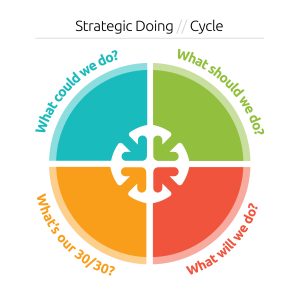Strategic Doing
re|course Is relying on a new approach to strategy, called Strategic Doing, which has been incubated at Purdue over the last 10 years. Developed by members of the Purdue Agile Strategy Lab, Strategic Doing represents an emergent form a strategy specifically designed for open, loosely connected networks.

By following simple rules, participants in a network can develop sophisticated strategies and complex collaborations quickly. They move them toward measurable outcomes and learn to make adjustments along the way.
Strategy Sprints
In order to accommodate the time pressures within Purdue ME, members of the Agile Strategy Lab have developed an innovation, called Strategy Sprints. These are 30 minute long workshops in which a strategy guide focuses the conversation on the core issues of strategy: Where we going? and How will we get there?
During the strategy Sprint, the Strategic Doing guide manages a conversation to design a new iteration of a team’s strategy. Approximately 70% of the time is spent focusing on defining measurable outcomes. About 30% of the time is spent focused on Pathfinder Projects and action steps.
Emergent or Agile Strategy
Emergent or agile strategy differs from strategic planning in fundamental respects. Emergent strategy combines principles of open source software development and agile software development. Strategy emerges over time, as participants moves through rapid think/do cycles.
This approach is fundamentally different than traditional strategic planning. Developed out of operations planning and World War II, traditional strategic planning focuses on the linear approach that is heavily analytic. It is costly, time-consuming, and not well adapted to the loose structures and intense time pressures of academic life.
By contrast, Strategy Sprints provide intense periods of deep strategic thinking that generate hypotheses embedded in Pathfinder Projects. Participants learn by doing. In the process, they build new bonds of trust that strengthen their networks and generate the data they need to design the next iteration of their strategy.
Join us
To learn more, consider joining a re|course team. Please feel free to connect with us. Or, jump right in by pinging us directly with the following form:

Recent Comments